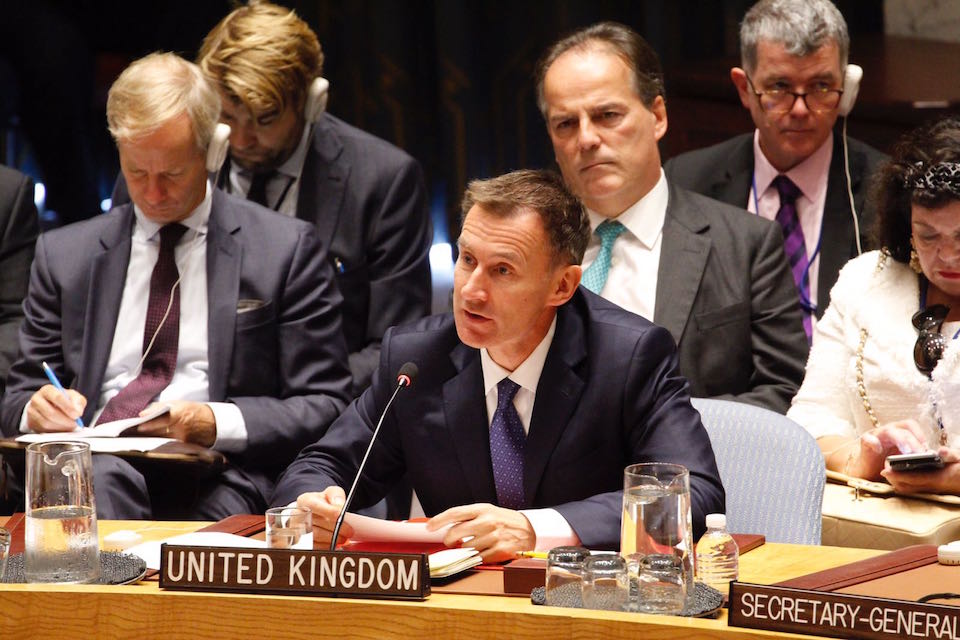North Korea must abandon its nuclear weapons: statement by Jeremy Hunt
The Foreign Secretary gave a statement on North Korea at the Security Council briefing during the 2018 United Nations General Assembly.

Thank you Mr. President.
In March 1963, President Kennedy predicted that as many as 25 nations would soon develop nuclear weapons, posing what he described as the greatest possible danger to the survival of humanity. In the event his bleak prophecy never came to pass. Seven years after Kennedy voiced his fears, the world summoned the collective wisdom to create the Nuclear Non-Proliferation Treaty, which now has 191 States Parties.
All but a handful of countries put aside their differences and agreed that global security, indeed the existence of the human race, depended on halting the spread of nuclear weapons.
Only 1 country signed the NPT and then sought to withdraw from it. Only 1 country promised in this Treaty never to develop nuclear weapons and then did exactly that. And that country is North Korea which has tested 6 nuclear devices in the last 12 years.
Today the international community shares a collective responsibility to ensure that North Korea complies once again with the rules on which the safety of every nation depends.
Britain welcomes North Korea’s decision to re-engage in diplomacy since the beginning of this year. We’re encouraged by the meeting between President President Moon Jae-in and Kim Jong Un in Pyongyang last week. We hope that North Korea’s repeated promises to denuclearise are genuine but we note the lack of concrete steps so far.
Action counts for more than assurances. Deeds must follow words.
North Korea must comprehensively, verifiably and irreversibly abandon its nuclear weapons, and the means to build them, in accordance with the resolutions passed by this Council. Until that moment comes, Britain believes that the sanctions agreed by the international community should continue to be rigorously enforced, reflecting our shared belief that North Korea’s nuclear ambitions threaten the safety of all our peoples.
This Council passed the relevant resolutions as one and we should enforce them as one until the conditions that caused their adoption have decisively and irrevocably changed.
Britain will continue to play our part in this effort. We’re supporting the work of the Sanctions Committee established by Resolution 1718 and the UN Panel of Experts.
The onus rests on the whole Council to prevent North Korea from evading sanctions, particularly the controls on refined petroleum products. We support the assessment presented by Secretary Pompeo and the United States, which demonstrates that North Korea has systematically violated the controls placed on the import of these products and already breached the annual cap for 2018.
This year, Britain has sent 2 Royal Navy ships, HMS Sutherland and HMS Albion, to the Pacific where they have helped to monitor illegal fuel transfers. A third ship, HMS Argyll, is due in East Asia later this year.
Members of this Council, especially the 5 permanent members, have a duty to uphold and enforce the sanctions contained in the resolutions which we ourselves supported. We mustn’t allow the authority of the Security Council to be undermined.
Today, North Korea’s leadership has a choice to make. In a country where 200,000 children are acutely malnourished, half of all schools have no access to running water, and only 3% of roads are paved, the regime has squandered the nation’s resources and deepened the poverty of its people by pursuing an illegal stockpile of nuclear weapons.
Far from bringing prestige or security, this arsenal has only increased tensions in East Asia and brought upon North Korea the most extensive economic sanctions ever imposed by this Council in the 21st century.
As recently as 1973, North and South Korea had about the same GDP per capita. Since then, decades of communist economic failure in North Korea have opened up a twenty-fold disparity: today, North Korea’s GDP per capita is less than 5% of South Korea’s.
But it is not too late to change course. Just as President Kennedy’s prediction turned out to be pessimistic, there is nothing inevitable about the road along which North Korea has so far travelled.
Before his regime wastes even more resources, creates yet more poverty and triggers still greater confrontations, Kim Jong-un could decide to allow his country to flourish in peace and safety. He could choose to heed the will of this Council, keep his own promises, and relinquish the nuclear arsenal that has brought only misery and tension. The decision rests on his shoulders. Until then, this Council should hold fast to the Resolutions that we passed.